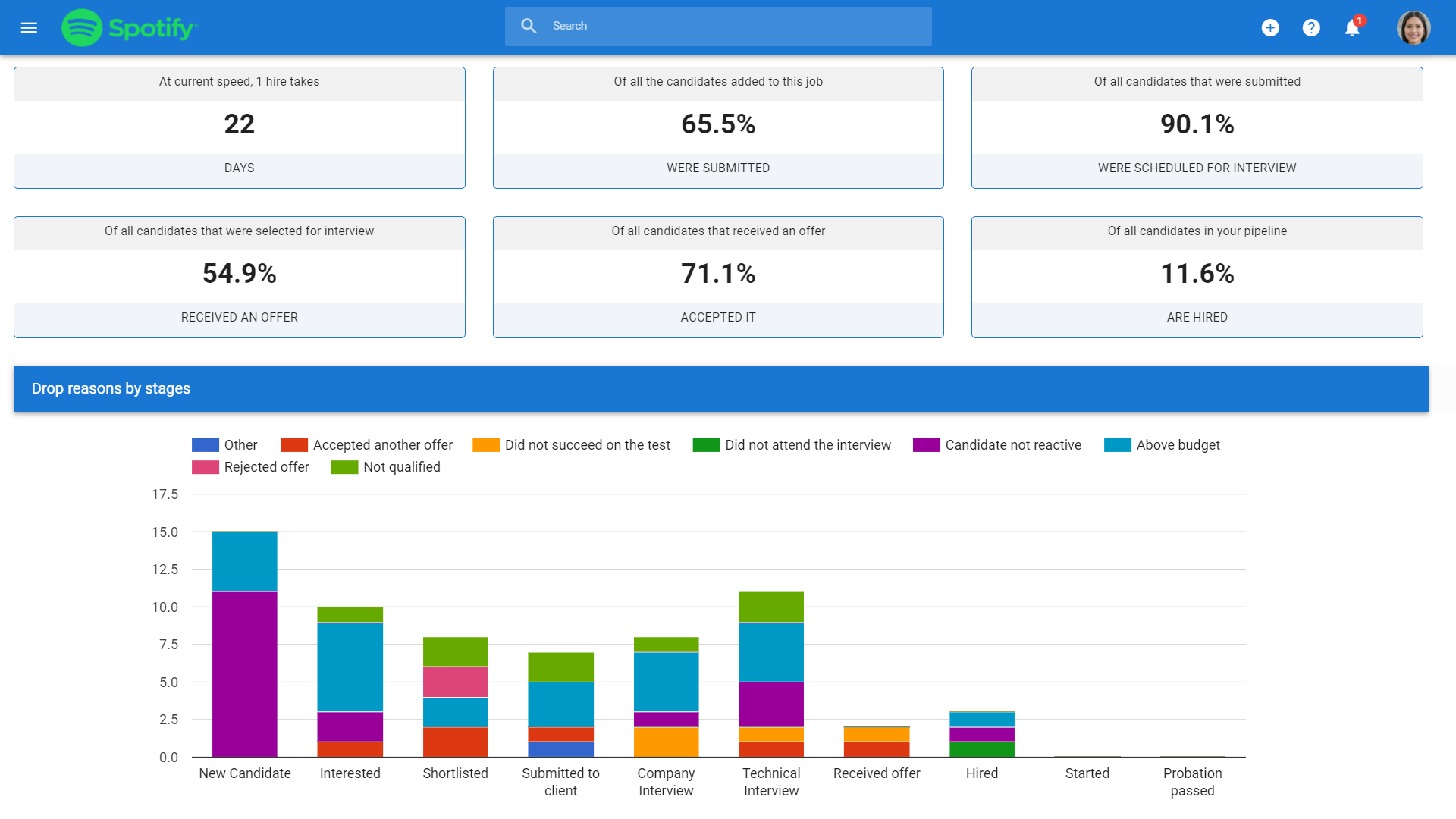Test Sales skills can help recruiters in sourcing candidates as well as dealing with their clients. In general, recruitment sales involve marketing yourself and your services to potential clients and employers. Successful sales techniques allow you to stand out from the competition, build relationships with potential clients, and ultimately grow your recruitment business, especially when sales are going down.
5 Sales Strategies to Make You a Better Recruiter
1) Solution Selling
Solution selling focuses on identifying client pain points and positioning your candidates as solutions to these specific problems. [1] As a recruiter, rather than simply highlighting a candidate's skills, you demonstrate how those skills directly solve the hiring manager's challenges.
Example: Instead of simply stating that you have a software developer with 5 years of Java experience, you could say: I understand your team is struggling with backend performance issues. I’ve found a developer who specializes in optimizing Java applications and has reduced load times by 40% at their current company.
2) Consultative Selling
Consultative selling positions you as a trusted advisor rather than just a service provider.[2] This approach involves asking thoughtful questions, actively listening, and providing valuable insights before making recommendations.
Example: A client is unsure about the salary range for a senior sales role. You analyze current market data, advise on a competitive offer, and suggest how this can attract top-tier candidates, building trust and credibility.
3) Value Selling
Value selling emphasizes the tangible business outcomes and ROI a client will gain from your recruitment services or candidates, not just features or qualifications. [3]
Example: Rather than highlighting your extensive database of candidates, explain how your specialized screening process has reduced average time-to-hire by 30% and increased new hire retention by 25% for similar companies in their industry.
4) The Challenger Model
The Challenger approach involves teaching clients something new about their business needs, tailoring your message to their values, and taking control of the conversation to guide them toward better decisions. [4]
Example: Share industry research with a client showing how companies that hire candidates with a specific combination of skills (that they hadn't considered) outperform competitors. Then introduce candidates who match this profile rather than just meeting the original requirements.
5) Referral Selling
Referral selling leverages existing relationships to build credibility and gain warm introductions to new potential clients, reducing the friction in establishing new business relationships.
Example: After successfully placing three developers at a tech company, ask your primary contact: "I noticed your company has a marketing department that might also need talent. Would you be willing to introduce me to the marketing director so I can explain how we helped your tech team?"
Sales Strategies Enhanced by ATS in Recruitment
Applying sales techniques in recruitment can significantly boost effectiveness when paired with an Applicant Tracking System (ATS). Solution selling focuses on analyzing company needs and finding candidates who address specific problems, with the ATS resume parsing feature that can scan resumes and extract relevant information from them into structured fields. You can search resumes by keywords, skills, experience, education, location, or other criteria. You can filter resumes by status, rating, source, or date as well.

Value selling presents the worth of tracking high-potential applicants and analyzing deep insights, with Talent Pipeline Management and Reports and Analytics features allowing recruiters to effectively monitor and demonstrate candidate value. The Reports and Analytics feature offers data and insights on your hiring process and performance. You can generate reports on various metrics. These metrics include time to hire, cost per hire, source of hire, quality of hire, diversity of hire, and candidate satisfaction. This information will assist you in identifying bottlenecks, gaps, or areas for improvement in your recruitment strategy.

Built-in reports in Manatal ATS
{{cta}}
Sales and recruitment: Key transferable skills
Empathy
Empathy is essential in recruitment. It forms the basis for meaningful connections with clients and candidates. Understanding the challenges faced by hiring managers is crucial. Equally, knowing the career aspirations of candidates helps create ideal matches. This ensures both parties' needs are met. Empathizing with hiring managers' difficulties in finding specialized talent allows for asking insightful questions. This empathy also helps uncover unstated requirements. Similarly, empathizing with candidates aids in presenting opportunities aligned with their true career goals. This goes beyond their stated requirements. Developing empathy requires active listening. It also involves asking thoughtful follow-up questions and recalling personal details. This reflects genuine interest in the situations of others.
Persuasion
Persuasion in recruitment involves communicating value. It helps clients and candidates identify mutually beneficial opportunities they may overlook. Successful recruiters persuade hesitant candidates to consider growth-oriented roles. Additionally, they convince hiring managers to interview candidates who, despite differing from initial specifications, offer valuable alternative perspectives. The best persuasion is rooted in genuine belief in the match proposed. This approach is supported by specific evidence aligned with each party's priorities.
Communication
Effective recruitment depends on clear and timely communication. It requires precisely describing candidate qualifications and setting accurate expectations for timelines and processes. Providing both positive and constructive feedback must be done with care.
Top recruitment professionals adjust their communication style for varied audiences. They use technical language with specialized hiring managers. For non-technical stakeholders, they provide approachable explanations. With nervous candidates, they employ supportive and encouraging language.
Strong written communication skills are essential. This involves crafting compelling job descriptions and candidate presentations. Additionally, professional follow-up emails maintain momentum throughout the recruitment process.
Organization
The complexity of juggling multiple job openings, candidate pipelines, and client relationships makes organization an essential skill in recruitment. Without systematic approaches to managing information and schedules, critical details fall through the cracks.
Successful recruiters develop personalized systems for tracking candidate interactions, scheduling interviews efficiently, and ensuring timely follow-up at every stage of the recruitment process. This organizational prowess allows them to handle higher volumes while maintaining quality.
A strong organization also manifests as preparation—having candidate materials ready before client calls, researching industry trends before strategic discussions, and anticipating questions that might arise during negotiations.
Industry Knowledge
Deep industry knowledge gives recruitment professionals credibility with both clients and candidates. Understanding industry-specific terminology, typical career paths, compensation structures, and emerging trends allows recruiters to have intelligent conversations that build trust.
Industry knowledge also enables recruiters to provide valuable market insights to clients, positioning themselves as consultants rather than mere service providers. This might include sharing information about competitor hiring practices, emerging skill requirements, or compensation benchmarks that help clients make better hiring decisions.
The most successful professionals in recruitment continuously invest in deepening their industry expertise through networking events, professional publications, continuing education, and regular conversations with thought leaders in their specialized fields.
What makes sales and recruitment so compatible?
Sales and recruitment are often viewed as distinct professional domains, but they share remarkably similar foundations and methodical approaches. The skills that make someone excel in sales frequently translate directly to success in recruitment, and vice versa. Let's explore what makes sales recruitment such a natural and powerful combination.
Generate Plenty of Leads
In both sales and recruitment, the process begins with a robust pipeline. Just as sales professionals need a constant flow of potential customers, recruiters must maintain a steady stream of qualified candidates. In recruitment, lead generation takes multiple forms:
- Building networks through professional platforms like LinkedIn
- Attending industry events and career fairs
- Creating referral programs that incentivize recommendations
- Utilizing targeted advertising to reach passive candidates
- Developing relationships with educational institutions
The most successful professionals in recruitment understand that quantity often leads to quality. By casting a wide net initially, they increase their chances of finding the perfect match, whether that's a sales prospect or a stellar candidate.
Understand Needs
The core of both sales and recruitment is understanding what people truly need, not just what they say they want. In sales recruitment, this means:
- Conducting thorough discovery calls to uncover unstated requirements
- Asking probing questions that reveal underlying motivations
- Listening actively to both clients and candidates
- Identifying pain points that might not be immediately obvious
- Translating vague desires into concrete specifications
This deep understanding allows professionals to make meaningful connections between opportunities and solutions, whether connecting a customer with the right product or a candidate with their ideal role.
Communicate Effectively
Persuasive communication is essential in both disciplines. Sales recruitment professionals excel at:
- Crafting compelling messages that resonate with their audience
- Tailoring their communication style to different personalities
- Articulating value propositions clearly and convincingly
- Managing expectations throughout the process
- Negotiating win-win outcomes that satisfy all parties
Whether selling a product or selling a job opportunity, the ability to communicate effectively determines success or failure in these relationship-driven fields.
Measure Your Results
Data-driven decision making separates the exceptional from the merely good in both sales and recruitment. Professionals in sales recruitment track metrics such as:
- Conversion rates at each stage of the pipeline
- Time-to-fill or time-to-close
- Quality of placements or sales
- Return on investment for various sourcing channels
- Long-term retention and satisfaction rates
By measuring results consistently, they can refine their approaches, double down on what works, and continuously improve their outcomes.
Conclusion
The synergy between sales and recruitment yields highly skilled professionals. These professionals excel in the competitive business environment of today. Top recruitment specialists have persuasion skills akin to leading salespeople. Additionally, they possess the ability to read individuals like experienced recruiters. This skill set makes them essential for organizations seeking to form high-performing teams.
Frequently Asked Questions
Q: How can sales strategies improve the efficiency of the recruitment process?
A: Sales strategies can significantly enhance the recruitment process. Introducing methods such as lead scoring and pipeline management yields better results. Recruiters can use candidate scoring similar to lead prioritization in sales. Rank applicants based on their qualifications, experience, or fit for the role. This helps focus efforts on the most promising candidates first, thus saving time and resources. Additionally, manage a candidate pipeline like a sales funnel. This ensures a steady flow of applicants at various hiring stages, preventing delays and reducing bottlenecks. By optimizing these steps, recruitment becomes faster and more efficient.
Q: How does personalization in communication affect candidate engagement?
A: Personalization significantly enhances candidate engagement by creating authentic connections. Generic outreach cannot achieve this level of engagement. Customized communications referencing specific candidate achievements or interests typically see 30-40% higher response rates than templated messages. This shows that recruiters have invested time to understand the candidate's background, thereby building trust early in the process. Beyond initial outreach, sustaining personalized interactions throughout the hiring journey is key. Addressing individual concerns, providing role-specific information, and tailoring follow-ups based on previous interactions keep candidates engaged. Those who receive personalized engagement tend to maintain positive impressions of the company, regardless of the outcome. This enhances the employer brand and supports future recruiting efforts.
Q: What are the challenges of integrating sales methodologies into recruitment practices?
A: Integrating sales methodologies into recruitment faces several key challenges. First, there's often cultural resistance, as recruitment teams may view sales techniques as manipulative or inappropriate for talent acquisition. Second, recruitment operates with different metrics and timelines than traditional sales, requiring careful adaptation of methodologies rather than direct implementation. Third, many recruiters lack formal sales training, creating skill gaps that require dedicated development programs. Fourth, balancing candidate experience with efficiency metrics can be difficult—pushing too hard for quick conversions might alienate quality candidates seeking thoughtful engagement. Finally, organizations frequently struggle with implementing consistent CRM practices across recruitment teams, leading to inconsistent application of sales methodologies and difficulty measuring their effectiveness.
Q: How can recruiters develop the sales skills needed for effective hiring?
A: Recruiters can develop essential sales skills through structured and practice-oriented methods. Training should start with objection handling. Recruiters need to engage in role-playing exercises to tackle common candidate concerns. These concerns may include questions on compensation, hesitations about relocation, or competing offers. Regular practice of consultative questioning techniques is crucial. The focus should be on open-ended questions to uncover a candidate's true motivations beyond surface-level career goals. Communication skills should be enhanced through recorded mock interviews. Feedback on tone, pacing, and persuasiveness is essential. Cross-functional shadowing with successful sales teams provides insight into real-world negotiation and closing techniques. Additionally, data literacy training is vital. It enables recruiters to interpret metrics such as conversion rates and time-to-hire. This knowledge allows them to refine their approach based on quantifiable results rather than relying solely on intuition.
Q: How can recruiters use sales strategies to compete in a tight talent market?
A: In competitive talent markets, sales strategies give recruiters critical advantages. Implementing value proposition selling—clearly articulating unique benefits beyond compensation—helps differentiate opportunities when multiple employers are pursuing the same candidates. Creating urgency through exclusive information (like pre-release project details or limited interview slots) can accelerate decision-making without appearing manipulative. Relationship nurturing through strategic touchpoints with passive candidates builds talent pipelines that can be activated quickly when positions open. Competitive intelligence practices help recruiters understand competitor offerings and proactively address how their opportunity compares.
—
Citations:





.png)






















.webp)

.webp)

.webp)
